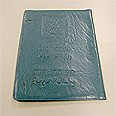
New IDs to be issued (illustration)
צילום: דפנה מקל
Knesset passes biometric database bill
Two-year trial period to test database before it becomes mandatory for all Israeli citizens
The Knesset on Monday adopted a bill establishing a biometric database in Israel, which will eventually lead to the replacement of regular identification with electronic IDs. Forty Mks supported the bill, 11 opposed it, and three abstained.
In addition to identification cards and passports, the database will also be designed to hold the fingerprints and visual scans of every citizen of Israel.
The bill is scheduled to be put into motion during the next few months, and a two-year trial period will then test the system by offering membership to those who desire it.
Interior Minister Eli Yishai said he would consult the Justice Ministry on where to anchor the database, whether in his own ministry or the latter.
During the trial period any citizen desiring an electronic ID card or passport will be able to join the database and receive the benefits that go along with it. Others will receive regular IDs.
A few months before the two-year period ends, ministers will have to present the results of the trial to the Knesset and its various committees. Only upon their approval will the law be put into effect, and all citizens will be included in the system.
The information in the database will be kept secret, and will therefore not be available to public scrutiny.
Critics of the bill claim no democratic country has established an obligatory biometric database. They also claim the system is prone to breaches and leaks.
MK Meir Sheetrit, who proposed the bill while serving as interior minister in 2008, claims countries such as the US keep biometric information on anyone entering the country. He also claims various experts were consulted on the issue of security, and that the system would be kept as confidential as any banking website.
"I hope the fear of change and progress will not deter MKs from supporting the bill," Sheetrit said before the vote. I know panic has been stirred by those wishing to frighten the public."
During the debate on the bill MK Nitzan Horowitz (Meretz), who opposed it, said the database was "risky, superfluous, and expensive".
He went to the stand and waved papers he said contained private details from the Interior Ministry's census. "Any child could do this; it's totally breached," he told Ynet later. "This is proof that these databases leak."
Niv Lillian, Ehud Kenan, Erez Ronen, Adar Shalev and Amnon Meranda contributed to this report










